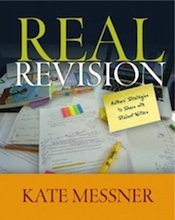Revision is writing.
A lot of writing is actually rewriting.
Developing ideas and writing them down, writing persistently, maintaining writing stamina. These are all important.
But rereading, re-seeing, re-visioning-- revising what we have initially written is a core part of writing and equally as important.
And what do we revise?
I am not talking about just correcting spelling or adding capital letters or sticking in commas that have been omitted. These are all surface level changes and are accomplished as we edit our writing.
Writing is about making choices as we put words down on paper or type onto our screens.
Revision and rewriting is about carefully examining those choices and the effect they have in our total composition.
Revision involves looking at our writing again, and making changes that improve the writing--changes in meaning or content, structure or style, word choice or tone, and so forth.
Revision means making deep changes in how the writing will be read by others, how it will be deconstructed and then reconstructed by our readers, how it will affect others, .
As we write we are asking ourselves among other things:
Am I saying what I intend to say?
Am I saying it clearly?
Am I saying if effectively, as well as beautifully?
Am I including all of the information that my reader will need?In other words, we ask writer's questions. We are attempting to communicate our ideas and feelings and beliefs, and share information. How well dare we doing this?
As we re-consider or reread our writing, we ask a different set of questions-- reader's questions:
Does it mean what I intend it to mean?
Does this sound the way I want it to sound?
Does it look the way I want it look?
Georgia Heard in the Revision Toolbox:: Teaching Techniques that Work, puts it this way:
Ultimately, the point of learning about revision is to learn how to help our writing match more accurately what's in our hearts. ( p.x)Rewriting may mean that we need to enter or exit our piece in a different way--rewriting our lead or our closing.
Rewriting may mean that sections, paragraphs, sentences, or words need to be rearranged--so we cut and paste (either literally or digitally.)
It may mean that a word is replaced with a more accurate, descriptive or specific word.
Revisions may occur in the way we tell our story--whose voice? which perpspective? whose point of view? Whose story are we telling? From which angle?
On his website, Ralph Fletcher offers young writers ideas about writing, including ideas for revising. Click here to read his tips.
Every aspect of expressing your thoughts may be reconsidered, revised, rewritten.
Each writer has particular ways of accompishing this crucial part of writing.
Kate Messner gives us a glimpse into effective strategies that professional writers use in Real Revision: Author's Strategies to Share with Student Writers. For each revision strategy she introduces, she also introduces us to several mentor authors who share their expertise, personal strategies, and helpful hints.
Once of the most important statements she makes in her first chapter is Revision is hard.
I can attest to this fact. Having finished drafting my book, the real work--the hard work--began in the revision process. In a box in my basement there must be at least 7 iterations of the entire book, as well as many versions of specific sections. Some versions I still revisit and use. They contain sections, elements or information that was removed in later versions, but that occasionally I need to use in the original, although deleted or revised state.
Messner says:
Revision is where stories start to sing. Where lumpy writing gets smoothed out and where good writing turn into great writing. It's the part where the real magic happens.
So how do we revise?
How do we decide which ideas stay and which need to go?
How do we think about our writing and reconcile
what we intended to say
with what is actually on the paper or the screen?
with what is actually on the paper or the screen?
How do we re-see, re-envision, revise what we have written?
What will make our words pop and jump – rising from the page
to reach our readers at their core?
How do we revise?Revision is hard.
But revision is necessary.
Revision is writing.
Today's Deeper Writing Possibilities
Select a draft or unfinished piece of writing.
Reflect on the purposes and intent of this writing.
Consider this writing in light of some of the questions and revision issues raised above.
How do you re-envision this piece to most effective, accurately, clearly communicate your ideas and intentions?
Rewrite your piece making changes that will transform your good writing into extraordinary writing.

No comments:
Post a Comment